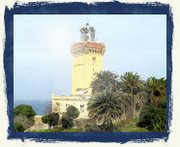 Esther and Omar Mendez are raising funds to bring education, medical supplies, food and clothing to less privileged children in El Salvador.
Esther and Omar Mendez are raising funds to bring education, medical supplies, food and clothing to less privileged children in El Salvador. *
By Ramola Talwar Badam,Dubai-based freelancer, FridayWhat Gulf for Hope charity
Where La Union, El Salvador
Who Esther and Omar Mendez, a couple based in Abu Dhabi
Why Helping educate less privileged children in El Salvador so that they might improve their circumstances by realising their potential
How Turn the page to find out how the Mendezes are setting up a charity, which was inspired by a trip to El Salvador three years ago...
German-born Esther Mendez still remembers looking into the bright brown eyes of a little girl named Iris whom she met while visiting her husband Omar's hometown, El Salvador three years ago. The six-year-old had been abandoned by her parents and as a result was being raised by a distant relative in the city of La Union.
Although little Iris was attending a school, which had very few facilities, and Mama Martha - the lady who looks after her - was earning a meagre $5 a week on which they had to survive, her eyes were brimming with optimism and hope. She was staying in a small windowless home adjacent to where one of Omar's relatives lived and had picked up a smattering of English words which enabled her to communicate with Esther and Omar.
It was the innocence in Iris' eyes that got Esther thinking about ways to help less privileged children like her. She wanted to do something, which would help children receive a proper education and be taught life skills to help them break free from their circumstances.
"It really started with Iris," says Esther. "We got to know her during our trip to South America in 2007. But even after I returned home, I simply couldn't forget her." When Esther and Omar returned to La Union in January last year, they took two suitcases full of children's clothes with them to distribute to the needy.

They also enrolled Iris in a private school, paying $380 for the year, which would take care of her books and uniforms.
Esther is a safety consultant in the oil and gas industry while Omar is an electrician. Education is the foundation that the couple want to build on. They moved from Houston in the US to live in Abu Dhabi a year ago.
Helping Iris get a proper education got them thinking about around 30 other children living near a railroad track close to Iris' home. "We found out that these kids were being ridiculed in school because they didn't have paper to write on. They used scrap paper picked up from bins to write on," recalls Omar. The couple decided to buy some school supplies - crayons, notebooks, and so on - to distribute to these children on their next visit.
The beginning
Omar had left El Salvador at the age of 16 for the US where most of his family have now settled. He returns once a year to La Union because he knows that there are many families who need help.
But it was only after he visited his home country with his wife that the idea of changing the lives of children by setting up a charity began to take concrete shape. "I didn't realise how many children we could actually help. When I went back with Esther, that's when we thought of making a difference," he says.
Registering a charity in El Salvador costs $2,000. To raise funds this, the couple shaved off their hair in exchange for sponsorship. They have decided to name the organisation Gulf of Hope.
After seeing the difference they were able to make in Iris' life when she started attending a better school, they decided to approach the local authorities so they could set up a more formal system of offering local children better education.
They also paid for the schooling and supplies for five girls who live near Iris' house. These girls go to a government school where they pay between $20 and $50 per child for the whole year.
Once the charity is officially registered with the authorities in El Salvador, the couple plan to pay for the hiring of an extra English teacher at the school. They also intend to fund two computers so that the children can learn more about technology. The couple also plan to have a local doctor pay monthly visits to the school.
Explains Esther: "If the children improve their English language and computer skills, they have a better chance of improving their circumstances. Our vision is to give them the opportunity to get away from $5-a-week jobs.
"I don't expect all of them to become fluent in English and move around the world,'' she says. "We only hope we will be able to facilitate in unlocking their potential."
Esther points out that without proper schooling, the children will end up in poorly paid jobs and would not be able to improve their lives.
Raising funds
But all of this costs money. To date, the couple has been dipping into their personal savings to make these changes. But they have now reached a point where they need help with funds to register the charity and to pay for the doctor and teacher. They are in the process of finding sponsorship to fund the children's education expenses. They have also been in touch with several companies to donate computers as well as an airline that they hope will waive excess baggage charges when they transport the clothing donation boxes to El Salvador.
"Sourcing funds to make the changes is priority," says Esther. "But even if we are not able to raise money, we will continue using our savings to help these kids as far as possible."
They are focusing their energies on community efforts. "We need a teacher from the area who can teach the kids and maybe even the parents too. We want these changes to be sustainable. The changes need to focus on the long-term, so that the initiatives can continue to develop even when we're not there," says Esther.
She then returns to the topic of Iris. "She (Iris) believes she is special. She has Mama Martha, the relative who looks after her. She also now has Mama Esther and another Mama, the mother of the girls who live next door," she adds.
But there is a tinge of sadness in her voice as she explains that Iris' case is not an isolated one. "There are many other kids who have a story similar to hers. I think there are only a handful of kids who still live with both their biological parents."
According to Omar, many young people left the country to search for work in the US due to the political instability that prevailed between 1980 and 1992.
"The reason I - and many others like me - left was because of the war," he says.
The couple calls the families once a month to keep track of the girls' progress in school. On visits to El Salvador, Esther checks their school books to gauge how well the children are being taught.
The couple and the girls share a strong bond even though they are physically separated.
Esther says it is touching to see Iris do so well in her studies. Not only does she lap up all that she is taught in school, she also imparts what she has learnt to her neighbourhood friends who are unable to attend a private school.
"She likes to share her knowledge," says Esther fondly. "She explains things to the other kids in her neighbourhood who are not attending a private school. I think they might know as many English words as she does by now!"
Setting an example
Before they embarked on setting up Gulf of Hope, the couple contributed extensively to international charities. Esther says she hopes their new drive will encourage like-minded people to volunteer.
"If you send money to charities, you don't always know exactly what is happening to your money. Here I know exactly where it's going because I directly influence how it is used."
She would like potential donors to visit La Union and see how their money can change lives.
"Come with us and see for yourself. I'm hoping to bridge this gap between just sending money and being involved hands-on. We have a house there and all are welcome to stay with us. You can speak to the kids and get to know them better and in turn get to know how your efforts are making a difference."
‘My hobby: studying'
Education is the key to their charity succeeding in its mission and for Esther, it defines who she is.
A principal engineer, she started out as a mathematician and now has three Master's degrees - in operations research, oil and gas engineering and in holistic nutrition. "While other people have hobbies, I study," she says. Omar, meanwhile, is busy studying German and Italian.
Esther was born in Cologne, Germany and has a British passport. She has worked in England, Scotland and the US, while Omar is from La Union and has a US passport. The two met in Houston.
So, what will draw others to help children in a country many people know little about? "I'm hoping that people will realise how fortunate they really are," says Esther. "I'm hoping that people will simply be touched by these kids' stories. If we can help even one child in the world in some little way, wonderful changes are possible."
Her eyes light up as she speaks of the children. "We want more for them so they may improve their lives. They need education to break away from the lives their parents lived."
Imparting life skills to children is also part of their long-term plan. While Omar will teach older kids handyman skills, Esther will teach the girls sewing so that they could one day set up their own small businesses.
Small steps that will go a long way:
Gulf for Hope's sponsor list so far includes relatives, colleagues and friends but you too can help. Esther regularly updates their blog with news at http://gulfofhope.blogspot.com. You can contact her at gulfofhope@gmail.com.
"Any contribution helps; it doesn't have to be money," says Esther. "Little things really can make a big difference in their lives. It's not about flashing money around and saying, ‘Look, we can get these kids into college.' It's about taking little steps... and we need to keep on walking."
Consider that...
* $5 provides school supplies for two children for six months.
* $25 provides school fees for a child for a month.
* $40 a doctor and dentist check-up for a child.
* $500 will provide quality, private education for a child for a year.
















